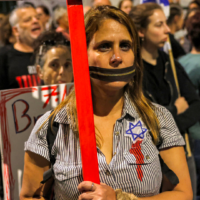 You’ve probably seen the headlines. Here and all around the globe, women’s groups are ignoring, denying, and even justifying the rape of Israeli Women and Children on October 7th. The Times of Israel reports on this shocking silence, noting that despite a “horrifying picture of systemic sexual assaults perpetrated against women and girls of all ages” during the October 7th Hamas massacre, “…many feminist and women’s rights organizations worldwide have remained conspicuously silent — and some are even questioning the veracity of the accusations. These denials of the sexual abuse by Hamas have far-reaching consequences, including the deterrence of other sexual abuse victims from seeking help.”
You’ve probably seen the headlines. Here and all around the globe, women’s groups are ignoring, denying, and even justifying the rape of Israeli Women and Children on October 7th. The Times of Israel reports on this shocking silence, noting that despite a “horrifying picture of systemic sexual assaults perpetrated against women and girls of all ages” during the October 7th Hamas massacre, “…many feminist and women’s rights organizations worldwide have remained conspicuously silent — and some are even questioning the veracity of the accusations. These denials of the sexual abuse by Hamas have far-reaching consequences, including the deterrence of other sexual abuse victims from seeking help.”
Miriam Schler is powering through the most traumatic moment of her 30-year career as Executive Director of the Tel Aviv Sexual Assault Crisis Center, working around the clock to support survivors while living through the ongoing fear, grief, nonstop funerals, and heightened trauma of her clients and staff living through the nightmare on the ground. Like all of our colleagues in Israel running domestic violence and sexual assault programs, Miriam reports how brutally re-traumatizing it is for the Center’s clients to learn of the mass rapes that took place on October 7th – and the silence and disbelief that followed. In this blog published in the Times of Israel, Miriam reports her greatest shock: not that the rapes happened (we who work in this field are no longer surprised by rape as a war crime, or so many other assaults on women’s bodies), but by the betrayal of supposed feminist allies. “So many who champion human rights, feminism and social justice – some of whom I have long considered friends or looked up to for their moral courage – have been bending over backwards to justify atrocities and rationalize rape….In over 30 years in the field of sexual violence support and prevention, I have never heard a support professional in the movement questioning the veracity of someone’s rape. Until now.”
In Canada Samantha Pearson, director of the Sexual Assault Centre at the University of Alberta, Edmonton signed a statement questioning whether any Israeli women and girls were actually assaulted by Hamas. How can the director of a campus rape crisis center become a rape denier? As Edmonton’s Jewish Federation notes, “Shouldn’t a sexual assault centre believe all victims, and not just the non-Jewish ones?” While Pearson was fired from her job, her position is not unique. Similar statements of denial have been issued by women’s groups and gender studies departments around the globe. Even the United Nations CEDAW (the 1979 branch of the UN focused on eliminating violence against women) was notably silent, until pressured into issuing a weak statement on November 25th, the International Day of the Elimination of Violence Against Women. In response, Danielle Ofek and Nataly Livsk launched #Metoo_UN_less_U_R_a_Jew, a grassroots global petition calling attention to the United Nation’s silence on sexual violence against Israeli women. As I write this today, Sheila Katz from the National Council of Jewish Women along with a group of Isrsaeli women are testifying in front of the U.N. to ask that the atrocities committed against Jewish women be recognized.
Since the early 1970s, the anti-rape and battered women’s movements have worked to create the very basic shared societal understanding that no one deserves to be abused. That rape is never justified. Have we turned the clocks back 50 years? Do those basic tenets not apply if a woman is Jewish? How is it possible that social justice leaders and so-called feminists can make a “Jewish exception” to justify the brutal, horrifying, bloody torture of women’s bodies paraded and glorified on social media on October 7th?
For many of us (myself included) who have worked our entire lives to make social progress on the elimination of violence against women, this moment reveals two stark truths: that women and Jews remain at the disposable bottom of the heap of anti-oppression work. When a small group of us started Shalom Bayit in 1992, it was precisely because no one believed that Jewish women could be abused. We have significantly moved that needle within the Jewish community. But this moment demonstrates that not much has changed about non-Jewish perceptions of us. When it comes to Jewish women, all our usual principles need not apply. So much for the “intersectionality” cry of today’s social justice activists.
How is this impacting domestic violence survivors? At Shalom Bayit, many of our clients can hardly think about anything else. Many are of course worried about family and friends who are kidnapped, missing, or in danger. Some are grieving lost loved ones. Others feel guilty for worrying about their own safety at home when so many are suffering atrocities. All are impacted by the victim-blaming, denial, and re-traumatization. Domestic violence survivors in the U.S. and Israel report similar reactions, as noted by Dr. Shana Frydman, director of the Shalom Task Force in New York, in her recent blog. As our Board member Dyanna Loeb noted in our Domestic Violence Awareness Month message, “As a domestic violence survivor, I’m all too familiar with the gaslighting & feelings of powerlessness that many of us are experiencing right now. I’ve been retraumatized by the justification, victim blaming, and outright denial of the sexual and physical abuse that Israeli women suffered at the hands of terrorists in the October 7 massacre. This… happens wherever women come forward about abuse. Now more than ever, it’s time to stand up for Jewish women’s safety.”
May we never be silent,

Naomi Tucker
Founding Executive Director

 You’ve probably seen the headlines. Here and all around the globe, women’s groups are ignoring, denying, and even justifying the rape of Israeli Women and Children on October 7th. The
You’ve probably seen the headlines. Here and all around the globe, women’s groups are ignoring, denying, and even justifying the rape of Israeli Women and Children on October 7th. The 
